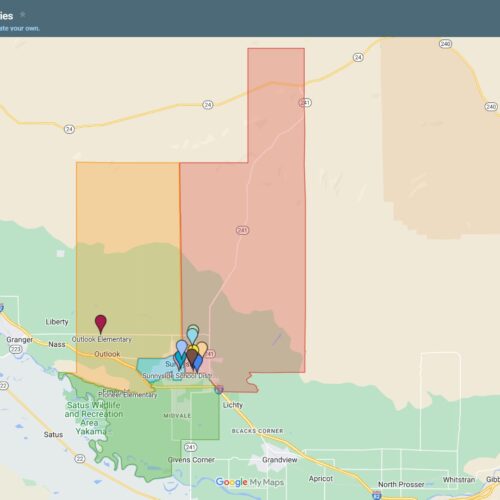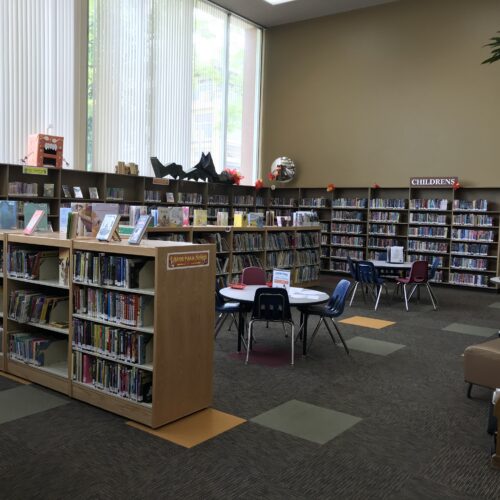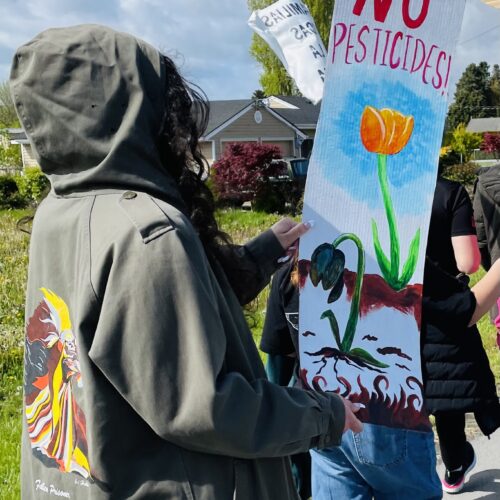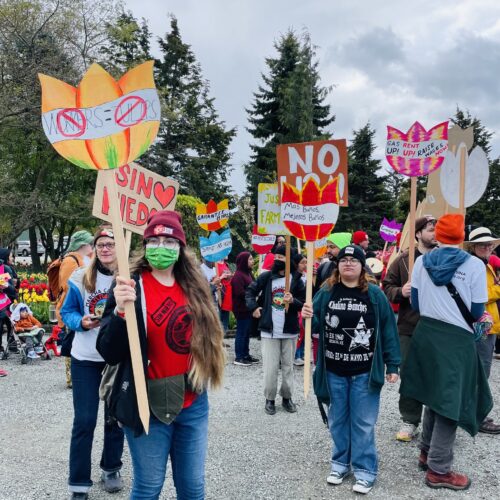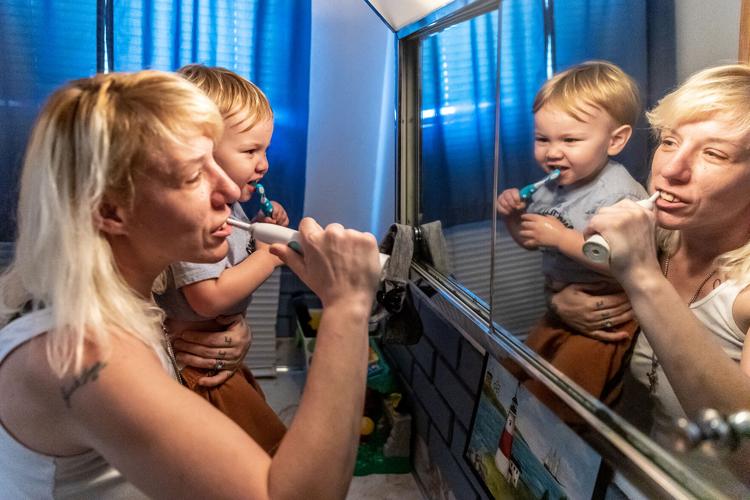
‘I survived so that I could change the cycle’ – Clarkston woman tells her story one year into addiction recovery
Listen
(Runtime 3:41)
Read
Thirty-nine-year-old Jennifer “Jennie” Hollenbeck lives in a quiet neighborhood in the Lewiston-Clarkston Valley, in a house decorated with photos of a young mother who reminds Jennie of her of herself years ago, and that woman’s son, whom she helps care for when the need arises.
A little over a year into her recovery from substance use disorder, Jennie said she’s trying to be the person she wishes she’d had.
Much of her life story, Jennie said, was colored by traumas — her mother dying when she was 4; cycling in and out of foster care; teenage pregnancy; a series of abuse from romantic partners; broken trust from people she believed were friends; struggles with PTSD, ADHD and bipolar. And, for much of her life, feeling like she was alone.
Before entering recovery last year, Jennie cycled in and out of substance use from the time she was in her late teens. When she first started, she had just left her husband, a man she married at 19 years old because of pressure from family after getting pregnant in high school.
“I tried to become what they wanted me to be. I was the mom, I was the wife,” she said. “He was abusive. He was an alcoholic. He worked night shifts, and I didn’t have help.”
After leaving, Jennie said, she had no support. Eventually, she met a man named Daniel, who would become her fiance. He and his mother took her in, she said. They also did drugs.
“His mom … I felt safe with her,” Hollenbeck said. “She felt like a mom to me, even though she was in that world. She kind of took me under her wing. And so I did the drugs with her.”
Those first times weren’t what got her hooked, Jennie said. Next, she would meet Jackie, a woman who became her best friend for years. Jackie and her mother became like family. On one occasion, they took Jennie shopping for her son’s birthday. That kindness and generosity was something she’d never had before, Jennie said.
“I held on to that,” she said. “Even through her mistakes.”
The first time Jennie tried pills it was with Jackie.
“For some reason, that was it. That gave me energy, that gave me like — I was like, on top of the world. And everything kind of went downhill for months,” she said. “I was down to 85 pounds. I didn’t eat on pills. The things that meth does for people, pills did that for me.”
Over several years, Jennie said, things went up and down. She overdosed on multiple occasions and a similar pattern would emerge. Jennie would run into trouble, Daniel or Jackie would come to the rescue.
But the people she relied on were also reinforcing a cycle of addiction. Her fiance saved her from some threats and created others, she said.
“He protected me,” she said. “Little did I know he was behind a lot of what was going on.”
Jennie’s turning point was two years ago. Daniel had gone to jail, leaving a friend “in charge” of Jennie.
Her memory from that time still comes back in fragments, she said. But what she does remember includes drugging, assault and manipulation.
When Daniel got out of jail, Jennie said, he blamed her, believing she talked about his crimes, though Jennie said she had never said anything.
“I was found facedown,” she said. “I was in the Boise trauma unit for three months. I was in the ICU for two weeks. I wasn’t supposed to survive.”
For most of her life, Jennie said, staying quiet had helped her survive. She took pride in “keeping her mouth shut.” She recalled an incident in Portland with Daniel, where she said police broke down the door.
“He went back to prison. It was a parole violation, but he almost threw me out a window,” she said. “They broke down the door one time and tried to help. And they — I — couldn’t (accept help). I was just too scared. And they said, if it ever gets too bad, just run, run for your life. So I ran.”
Jennie didn’t immediately get sober when she decided to run but she did survive.
After the hospital, she spent two weeks homeless in Portland. Eventually, with the help of strangers, she made it to LC Valley Adult Resource Center, which operated the winter of 2021-2022 in Lewiston.
There, she met a friend, Matt. When other men at the shelter were attempting to lure her into the bathrooms, she said, Matt helped her stay safe.
Eventually, Jolene Cliffe, the director, helped Jennie secure a motel voucher.
“My mom was a drug addict. My dad was an alcoholic. And I had four other siblings that I raised,” Jolene said. “So for me, it’s really easy for me to peg who’s serious and who’s not serious about getting their life together, making change. And she was one of the ones that when I was there, I saw that in her.”
A woman named Melinda, who worked at the shelter, connected with, and saw something, in Jennie. She gave Jennie a chance, taking her into her home for a month.
Later on, when Melinda moved to another state, Jennie stayed.
“Melinda, she lived in this house,” Jennie said. “Those two women, they helped me a lot, as much as I was willing to let them help me.”
Those few people giving her a chance was what helped her get clean, after years of trying, she said.
“They were willing to take a chance on me,” she said. “They saw who I was, they were willing to help when nobody else was. They didn’t allow opinions, or whatever, or rumors, or anything they had heard, or seen, or anything, stop them from being willing to help me.”
As Jennie talks, she sits on the couch in her living room, across from the photos of the mother and son propped on her TV stand.
Now, she said, she’s trying to be the Matt, or Jolene, or the Melinda, in someone else’s life. She’s hoping to become a recovery coach. She said she’s not willing to accept the lack of resources in the valley. Some people think there’s enough resources, Jennie said, but she disagrees.
“You think, ‘Oh, we have places, we have Riverside, we have enough.’ There is not enough,” she said. “Like, getting help for mental illness and everything is not always something you get from a doctor or somebody with a title.”
Jolene said Jennie is right about a need for more resources.
“Everybody that’s in any kind of recovery service, be it counseling or outpatient treatment or anything. Everybody’s overloaded. I am slammed with just doing peer support to try and fill that gap there. And everybody else is, too,” she said.
The people who helped her most weren’t doctors, Jennie said. They were normal, everyday people, like Melinda, who chose to take a chance on her. Jennie said another big step in her recovery was getting recovery coaching at First Step 4 Life which is currently closed for restructuring and funding reasons.
“That’s what people need,” she said. “They need to find what works for them. And First Step gave people a way to figure out what works for them. Not to be picked, like ‘oh, this is your doctor and this is what they’re gonna do for you.
Jennie looks again at the photos of the mother and the boy. Then her eyes shift to her left — a memorial with a photo of her own mother.
“My mom died before she was willing to let the cops help her,” Jennie said. “I survived so that I could change the cycle in my family, in this world, of women who die before they’re willing to talk.”
Successful recovery is predicated on a willingness to change, Jolene said. It’s something no one else can do for a person in recovery.
“When she first came in, I said, ‘I can’t care more about you than you care about you. So are you gonna pay attention or not?’” Jolene said. “She came back the next night. There has to be that willingness to change. And I saw that in her, and I wasn’t wrong.”



